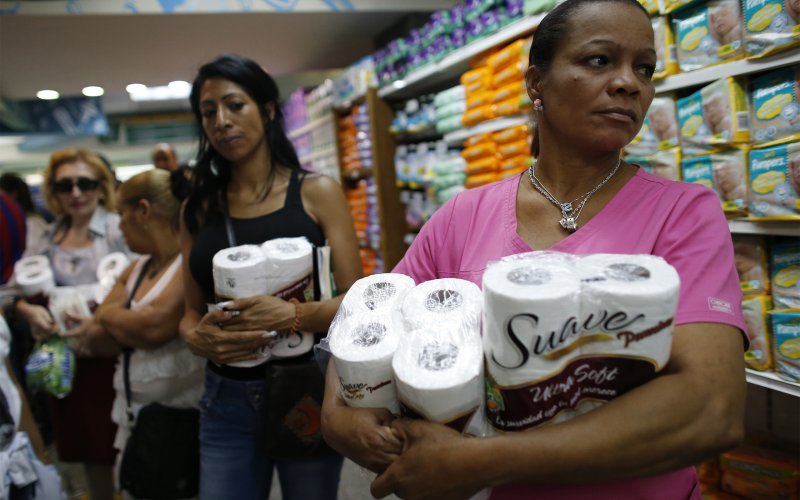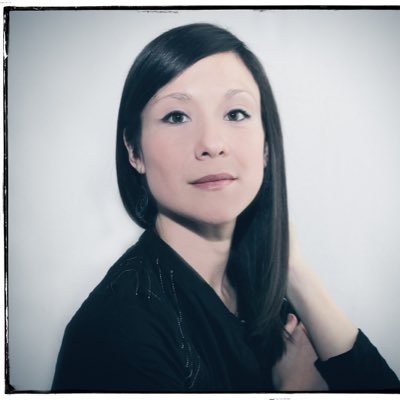
Of Diapers and Dictators in Venezuela
 A trip home to a country coming apart.
A trip home to a country coming apart.
“Welcome to the Maiquetia Simón Bolívar International Airport,” said the stewardess with a metallic voice as our plane touched down on Venezuelan soil. The excitement of a family reunion and anguish over the situation in the country shook me out of a brief sleep after eight hours flying from Paris. I was coming back to my country after three years of absence, in the company of my almost-2-year-old daughter and her father. The two most important people in my life were going to depend on me for 15 days traveling in Venezuela, a place increasingly unknown to me and radically distinct from the country I abandoned a dozen years ago when I moved to France.
For the first time our daughter would meet her grandmother who, because of the price of air tickets (about $3,000), had been unable to come see our baby when she was born. This was also the first visit to my homeland by my husband, who was interested to discover this country made famous by the iconoclasm and logorrhea of the late Hugo Chávez.
We’d been preparing for the trip for weeks, and every day I’d gotten WhatsApp warnings from friends and family: “Bring medicines for fever because you can’t get them here”; “Do not forget extra diapers because there aren’t any”; “Why not come another time? Things are very difficult”; “Find some mosquito repellent because there’s Zika, dengue, and chikungunya all over the country”; “I do not want to scare you, but bring milk for the baby and be discreet about the journey, don’t publish anything on social networks because it’s dangerous.”
As a photographer and journalist I have seen some pretty unpleasant aspects of my country while covering sensitive stories about violence, health, presidential elections or the death of Hugo Chávez. I’ve never been afraid to speak with thugs, or go into troubled areas. But on this trip everything was different. This was the first time I traveled as a mother and wife, and all these warnings worried the hell out of me.
The orders placed by family and friends could not be put off. Although we are usually very practical and travel with just one suitcase for three, this time we took four suitcases. In them, in addition to our clothes, we took laundry soaps, deodorants, shampoo, toothpaste, coffee, makeup, nail polish, condiments for cooking, toilet paper, tuna, diapers and medicine for my daughter (in case of fever, vomiting, diarrhea, conjunctivitis, dehydration, ear infections, burns, allergies, sore throat, tonsillitis), et cetera and et cetera.
The country lacks everything, so even if you have money you can’t get what you need. Some friends asked us to bring cash or medicines or other things for their parents, so we wound up carrying paracetamol, dollars, drugs for stress, eye drops, euros, antihistamines, one cellphone, two boxes of tea, vitamins, hair dye, a pair of shoes, and I was forced to leave some other things behind for lack of space. The feeling as I closed the suitcases was deep anger, indignation, and sadness.
In 1999 I traveled to Cuba. I wanted to see what a revolution looked like. I didn’t go there out of admiration. I had a pretty clear idea about the reality of that country, and my suspicions were confirmed by the everyday life that was hard, hostile, and miserable. On that trip I carried in my backpack many of the things I was carrying now to Venezuela—in 2016—when I wanted, proudly, to teach my new family about my beautiful country.
Since my last visit three years ago, I had lost all sense of the inflationary cost of living. In 2015 accumulated inflation peaked at 141.5 percent, according to figures from the Banco Central de Venezuela. For 2016, the International Monetary Fund forecasts a rate of 720 percent. Given these schizophrenic prices, everything is incomprehensible to those of us who live outside of Venezuela.
In concrete terms, it translates into the absurd effort to comfort my family with the contents of four suitcases. It translates into long lines patrolled by soldiers displaying their weapons, watching over the purchase of cooking oil, sugar, and toilet paper as if they were gold bullion. It is evident in the cereal box whose price is the same in Caracas as in Paris—although the minimum wage in Venezuela is $11 a month, like Cuba. It’s also obvious in the quality and quantity of things a family buys in the market (forget olive oil, biscuits, or tuna), in urban blight and rickety houses where the refrigerator is failing, electric cables go unrepaired, cars sit full of dust because there are no spare parts, and water faucets drip endlessly for lack of a rubber washer. When the most basic things are so scarce, aesthetics are no longer a priority.

Federico Parra/AFP/Getty
People queue at a bakery in Caracas on Feb. 25, 2016. On any given day, people in Venezuela can wait hours to get some subsidized milk, cooking oil, milk, or flour—if they can find any—with some bakeries rationing their bread production and others selling no bread at all.
“Take this, it’s for a ham sandwich and one drink per person,” says Aunt Iruña, our hostess in Caracas, as she handed me a package of bills about 2½ inches thick. I thought it was a joke at first and, nervous and incredulous, I laughed. But I had to improvise a handbag to carry the packet of money. There were 12,000 “strong” bolivars, the equivalent to $12 U.S., and at that they only bought three sandwiches and three drinks. I later learned that ATMs have limits of 4,000 bolivars ($4 U.S.) per transaction because the currency is so bulky. Users need to withdraw money multiple times, which generates long lines. Permanent stress, fatigue, and humiliation make for a dangerous time bomb that has the country on the brink of collapse.
The shadow of insecurity is always present. A driver who suddenly gets off his motorcycle at a traffic light makes us turn pale and accelerate away at full speed. We are warned repeatedly to get home, and get in, early. The armored cars of those who can afford them are impressive; so are the control systems set up to watch over children in schools and avoid kidnappings; and so are the increasingly fortified buildings. We’re told that rule No. 1 is never to take a taxi that’s not from a formally registered company. We try to escape from the stories friends and family tell us about robberies and assaults, while talk about the country’s situation and its possible future turns bleak.
There is not one person we talk to, regardless of income or class, who does not agree that the solution for the country is to get rid of the grim legacy of Hugo Chávez, now inherited by the inefficient and mediocre government of Nicolás Maduro.
I met with an old friend, Tatiana Aguirre, a surgeon, who described with horror the state health system in the country. Lack of medicines, violent deaths, sanitary and security conditions of hospitals are a national tragedy that the government tries to ignore. “It’s falling to pieces and nobody is stopping it,” she said.
Tatiana wants, like many other professionals, to explore opportunities to work in another country. The brain drain is a direct consequence of the conditions of life. She says she’s done everything in her power to move forward, but “there will come a time when I can no longer help my patients, we’ve been practicing combat medicine for a while.”
As I went through passport control to take the plane back home, a soldier commented on my hairstyle and tried to engage me in a flirtation disguised as an interrogation and a security check, an ironic and depressing farewell to one of the least secure countries—with one of the highest rates of violent death—in the world.
Days after we left Venezuela an Egyptian sailor was killed in Maiquetia airport while resisting a robbery a few meters from a police control.
Once we were back in Paris, we heard there were new power outages in Venezuela and riots broke out in several cities. My mother, on the other end of the phone, felt she could finally tell me about all the fears she’d tried to contain during the 15 days of our visit. Despite her sadness at parting with her granddaughter, she was relieved that we were back home.
I always used to tell friends in Havana that Venezuela would never live the same story they had, and I wasn’t wrong about that. We are not the same, we are a bad copy of Cuba. In many respects we’ve gone through similar hardships, but Cuba never experienced the inflation and the insecurity that Venezuela, to its shame and chagrin, is experiencing now.
Beautiful Venezuela is still there, though battered. It survives in its spectacular landscapes and its lovely people. Our daughter enjoyed her grandparents, and we did not, in the end, have to resort to our arsenal of drugs, which we left for other children. My husband, meanwhile, got to see the true face of socialism (or whatever it is) in the 21st century: an operetta funded with the money of its citizens in a ruined country where the eyes of Chávez staring out from countless walls may see what they did not when he was alive—that his revolution is a great fiasco and, without oil money, that truth can no longer be hidden.
Saraí Suárez is a Venezuelan photographer, videographer and journalist. Her work has been published at The Wall Street Journal, The Atlantic, El Clarín, Letras Libres.


